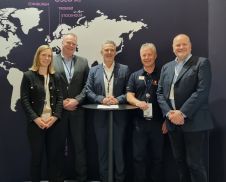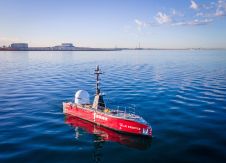Hydrographic Society Russia
In October 2008, HSR member Vadim Myatelkov participated in the fifth Russian-American expedition in the Bering Strait as part of the RUSALCA-2008 (Russian-American Long-term Census of the Arctic) programme. The research was carried out on the Russian research vessel Academic MA Lavrentyev with financial support from the Arctic research programme of the National Oceanic and Atmospheric Administration and the Russian Academy of Science.
Objectives
The long-term objective of the programme is to perform detailed monitoring of changes in the climate in Arctic regions, including monitoring the heat- and salt-exchange processes between the Pacific and Arctic Oceans through the Bering Strait.
Completion of the programme will give access to the knowledge gathered by American and Russian scientists involved in the joint project. Gathering the hydrological data for American and Russian databases forms a basis for a joint estimation of change in climate and water exchange in Arctic regions.
Results
The key results of the expedition are:
- 6-8 October 2008: lifting eight autonomous buoy stations in the Bering Strait equipped with American and Russian devices. This was carried out successfully. The acquired data represent an annual sequence of measurements of currents and other hydrological parameters of the sea environment in the Strait.
- 8-10 October 2008: eight autonomous buoy stations, also equipped with American and Russian devices, were installed in the western and eastern parts of the Bering Strait to perform measurements for one year. Collected data should give unique material with which to estimate spatial and temporal hydrological characteristics and descriptions of processes in time-scales from one hour to one year.
- On the route from Anadyr (Russia) to Nome (AL, USA), the mercury content in air was measured. The collected data confirm a mathematical model of global atmospheric transfer of mercury from areas of anthropogenic issue in East Asia and Europe to the Sea of Japan and Arctic region, respectively.
- Due to adverse hydro-meteorological conditions, research using hydrological standard deviation sondes and ground sampling has not been carried out. The collected data contribute to the long-term sequence of measurements in the Bering Strait region and adjacent seas. The acquired information will also allow the continued study of oceanographic and hydro-biological characteristics, and their spatial and temporal variability (with time-scales from one hour to several years).
RUSALCA-2009
Research within the scope of the RUSALCA programme yields unique material with which to study the processes in the water exchange zone between the Pacific and Arctic Oceans. Co-operation of Russian and foreign scientists allows them all to exchange data and raises the efficiency of scientific research.
The next expedition under the expanded RUSALCA programme has already been planned for 2009.

Value staying current with hydrography?
Stay on the map with our expertly curated newsletters.
We provide educational insights, industry updates, and inspiring stories from the world of hydrography to help you learn, grow, and navigate your field with confidence. Don't miss out - subscribe today and ensure you're always informed, educated, and inspired by the latest in hydrographic technology and research.
Choose your newsletter(s)
























